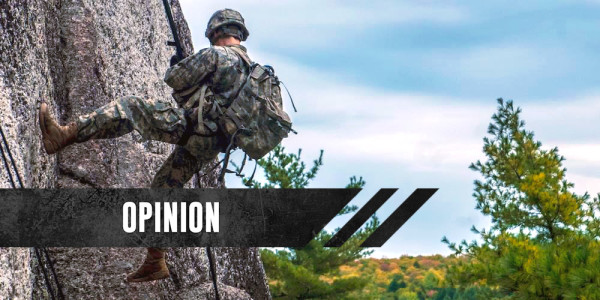

I stared at the bare rock face, harnessed up with ropes and carabiners, wondering where to start my climb. I had become overweight and inflexible since my separation from the Army in 2007, yet I was determined to climb up to the top of this short cliff. All of the other veterans who were watching cheered me on and shouted out pointers: “There is a hold to the right of your hand! Put your foot on that ledge!”
The experience, a 2015 rock climbing expedition in upstate New York, had been fun so far, the kind of fun veterans experience when among other veterans, that immediate comfort level we instantly share. This was the kind of veteran’s retreat like many designed to help us heal from our traumatic experiences. Immediately, we bonded through our connections and shared experiences as service members. I did not succeed in climbing to the top that day, but I tried my best and enjoyed encouraging others in the group. That night, as we camped in a remote area, we built a campfire and gathered to share jokes, mishaps, and accomplishments from the day.
We were in full jokester mode until one of our leaders asked us to get serious for a moment.
Anyone who had been on a therapeutic veterans retreat knew this moment well. These outdoor adventures had to have some grander meaning, and tonight’s task was to examine our lives in relation to overcoming the literal rock obstacles of the day. One by one, we were expected to relate a painful past experience from our service to a specific challenge from the day as a form of therapy for our damaged selves.
I guess the idea behind the outdoor adventure was that we would all find ourselves and be comforted by nature. I just wanted to go rock climbing.
As a post-9/11 military veteran, you could make a full-time job out of indulging in the dozens of services offered that help with our transition into the civilian world, especially by nonprofits that specifically serve veterans. But too often, these nonprofits function on the premise that, as veterans, we are all somehow damaged by our experiences in the military and that we must be fixed.
This kind of thinking, while valiant, instead puts veterans into the category of “other,” further separating us from our civilian counterparts and perpetuating the myth that veterans will continually struggle to transition back into civilian society.
I guess the idea behind the outdoor adventure was that we would all find ourselves and be comforted by nature. I just wanted to go rock climbing.
Since I left the Army, I have had several wonderful experiences due to the generosity of nonprofits. I embraced rock climbing and hiking, traveled on fishing expeditions, attempted stand-up comedy, built a solid resume, and engaged in therapy for PTSD. From each of these experiences, I gained new insight into myself, and I do not doubt that each of these nonprofits has helped others in remarkable ways.
This is not a call to end all veteran nonprofits, but rather for an examination into the assumptions which are made in their founding.
American military service is unique in that service is voluntary and only undertaken by a small percentage of our population. Many people are eager to honor veterans’ service, and many vets certainly do return to the United States with the physical and emotional damage that require different kinds of help. I have struggled with PTSD and other kinds of mental illness as well as a severe back injury, and I have been helped by different organizations along the way.
The most helpful programs, though, are ones designed to help us to reintegrate rather than propagating the “disabled veteran” label, whether it’s physically or emotionally, that actually continues to separate us from the civilian world.
Please let us not end the multitudes of therapies out there for military veterans: the outdoor adventures, the arts programs, the service projects and the like. Bonding with other veterans is not only therapeutic without the therapy — it’s fun.
But when establishing new organizations in the future, we should focus on reintegration rather than separation. As veterans, we should stop arrogantly viewing ourselves as “special.” The sooner veterans are able to blend back into civilian life, the sooner veterans can offer their unique skills, talents, and insights into civil society.
